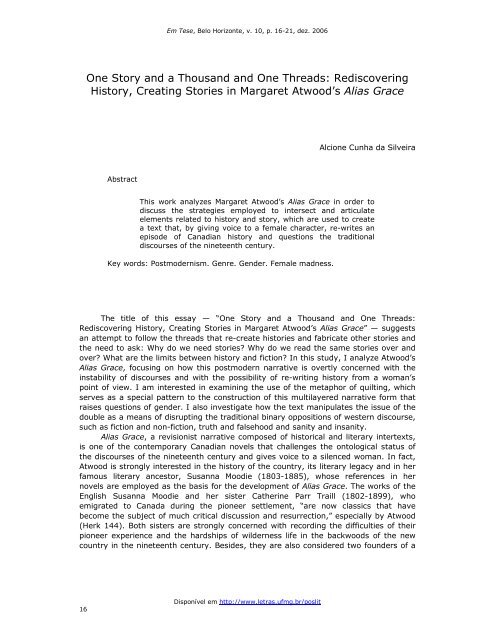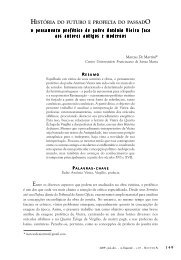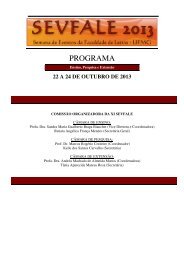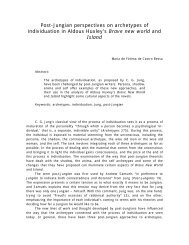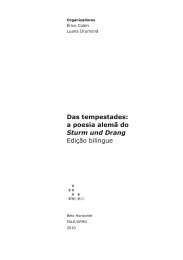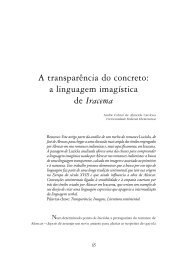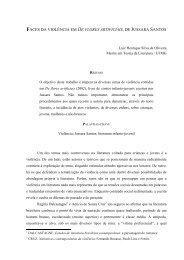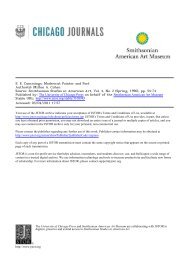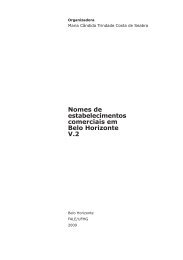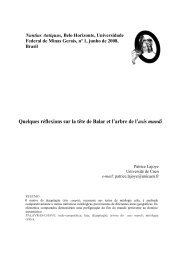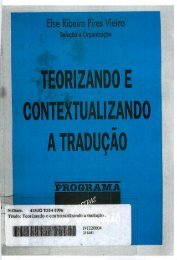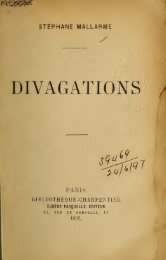Contornos do Indizível: o estilo de Clarice Lispector - Fale - UFMG
Contornos do Indizível: o estilo de Clarice Lispector - Fale - UFMG
Contornos do Indizível: o estilo de Clarice Lispector - Fale - UFMG
You also want an ePaper? Increase the reach of your titles
YUMPU automatically turns print PDFs into web optimized ePapers that Google loves.
16<br />
Em Tese, Belo Horizonte, v. 10, p. 16-21, <strong>de</strong>z. 2006<br />
One Story and a Thousand and One Threads: Rediscovering<br />
History, Creating Stories in Margaret Atwood’s Alias Grace<br />
Abstract<br />
Disponível em http://www.letras.ufmg.br/poslit<br />
Alcione Cunha da Silveira<br />
This work analyzes Margaret Atwood’s Alias Grace in or<strong>de</strong>r to<br />
discuss the strategies employed to intersect and articulate<br />
elements related to history and story, which are used to create<br />
a text that, by giving voice to a female character, re-writes an<br />
episo<strong>de</strong> of Canadian history and questions the traditional<br />
discourses of the nineteenth century.<br />
Key words: Postmo<strong>de</strong>rnism. Genre. Gen<strong>de</strong>r. Female madness.<br />
The title of this essay — “One Story and a Thousand and One Threads:<br />
Rediscovering History, Creating Stories in Margaret Atwood’s Alias Grace” — suggests<br />
an attempt to follow the threads that re-create histories and fabricate other stories and<br />
the need to ask: Why <strong>do</strong> we need stories? Why <strong>do</strong> we read the same stories over and<br />
over? What are the limits between history and fiction? In this study, I analyze Atwood’s<br />
Alias Grace, focusing on how this postmo<strong>de</strong>rn narrative is overtly concerned with the<br />
instability of discourses and with the possibility of re-writing history from a woman’s<br />
point of view. I am interested in examining the use of the metaphor of quilting, which<br />
serves as a special pattern to the construction of this multilayered narrative form that<br />
raises questions of gen<strong>de</strong>r. I also investigate how the text manipulates the issue of the<br />
<strong>do</strong>uble as a means of disrupting the traditional binary oppositions of western discourse,<br />
such as fiction and non-fiction, truth and falsehood and sanity and insanity.<br />
Alias Grace, a revisionist narrative composed of historical and literary intertexts,<br />
is one of the contemporary Canadian novels that challenges the ontological status of<br />
the discourses of the nineteenth century and gives voice to a silenced woman. In fact,<br />
Atwood is strongly interested in the history of the country, its literary legacy and in her<br />
famous literary ancestor, Susanna Moodie (1803-1885), whose references in her<br />
novels are employed as the basis for the <strong>de</strong>velopment of Alias Grace. The works of the<br />
English Susanna Moodie and her sister Catherine Parr Traill (1802-1899), who<br />
emigrated to Canada during the pioneer settlement, “are now classics that have<br />
become the subject of much critical discussion and resurrection,” especially by Atwood<br />
(Herk 144). Both sisters are strongly concerned with recording the difficulties of their<br />
pioneer experience and the hardships of wil<strong>de</strong>rness life in the backwoods of the new<br />
country in the nineteenth century. Besi<strong>de</strong>s, they are also consi<strong>de</strong>red two foun<strong>de</strong>rs of a


